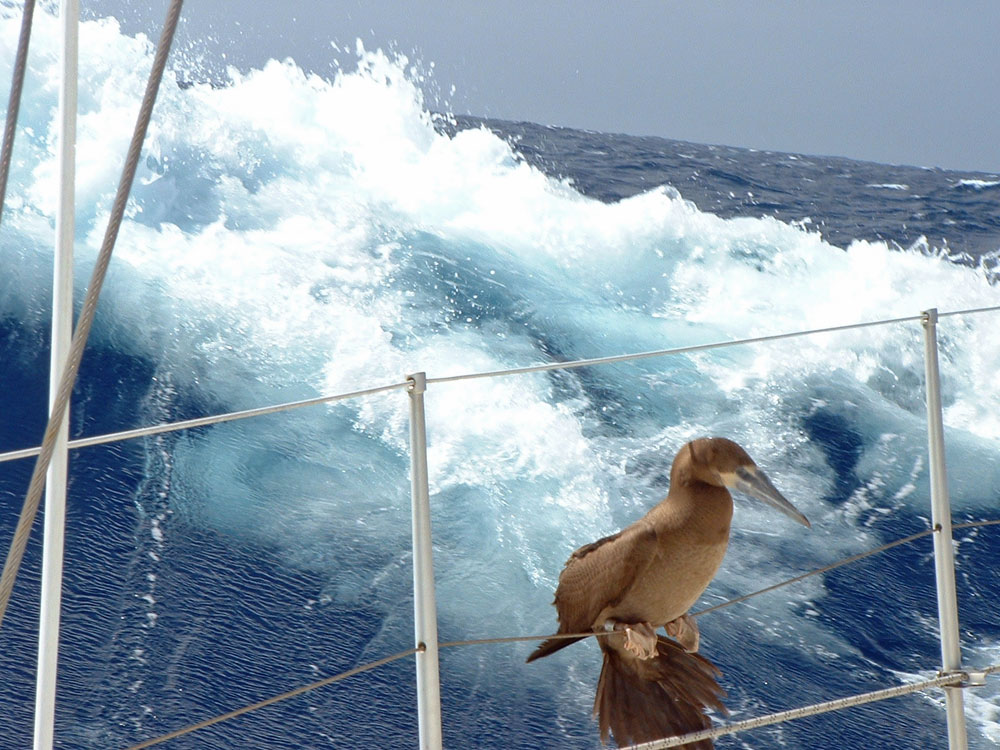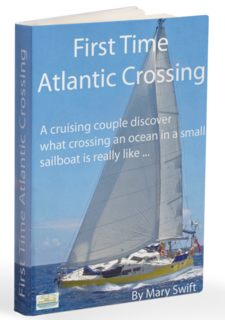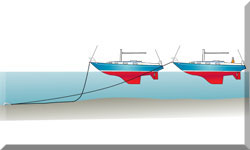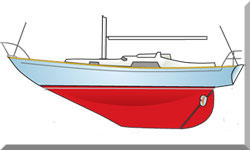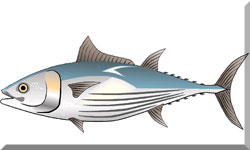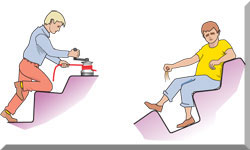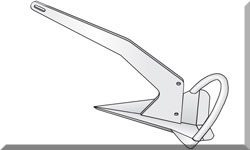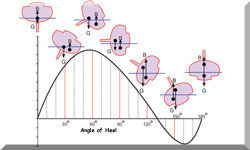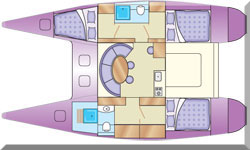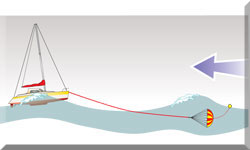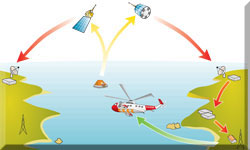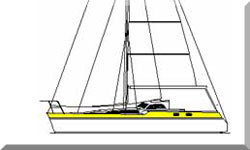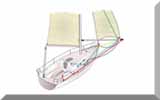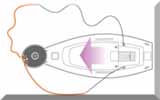- Home
- Offshore Sailing
- Brown Booby
A Brown Booby Comes Aboard
This fellow arrived aboard Alacazam some 500 miles northwest of the Cape Verde Islands during a passage to the Caribbean in January 2002. An immature gannet I thought initially, before Mary referred to Peter Harrison's wonderful book, "Seabirds" which identified him (or maybe her) as a brown booby.
Boobies get their name from their tameness and lack of fear of humans; early mariners, who so named them to denote their presumed lack of intelligence, easily approached and killed them.
The Bird, as he became known, enthralled us daily with his magnificent flying displays, gliding effortlessly through the wave troughs with his wingtips just clear of the sea. But this aerial elegance evaporated completely once the landing gear was down.
We witnessed several cartwheels over the guardwires, tee-bones into the hullside and entanglements with the rigging when things moved into the wrong place after commitment to touch down had been made.
Repeated attempts to balance on the guard wires with webbed feet were usually unsuccessful. I was reminded from my school days of having to write out 100 times, the lines: Stupidity is doing the same thing over and over again, and expecting a different result.
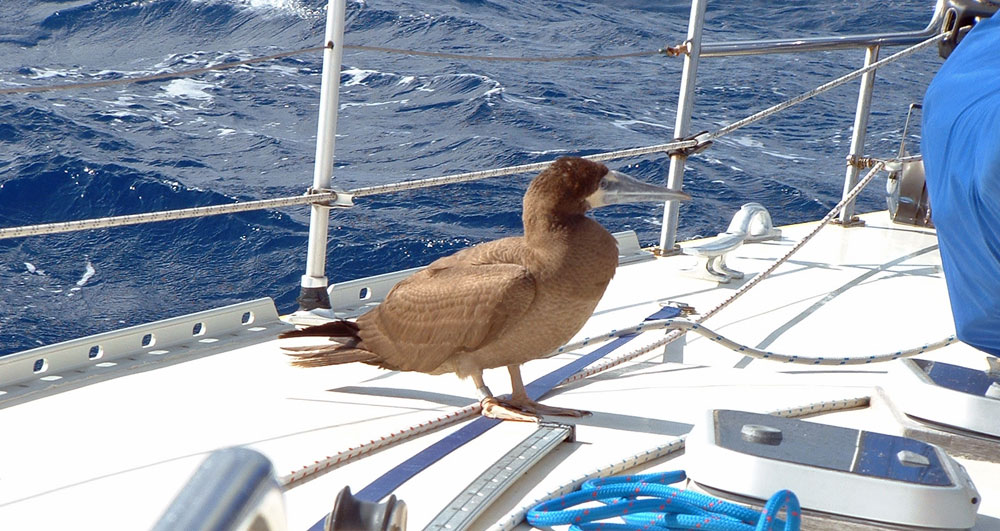 Safely aboard...
Safely aboard...Long sorties over the horizon were frequent, but not once did we see him diving for fish as boobies and gannets normally do; that is hovering head down over a luckless fish, prior to plunging dart-like after it into the sea.
Bird had developed a much more energy efficient technique. He would sit on the foredeck scanning our bow wave, waiting for a shoal of flying fish to erupt from the surface. Instantly, he would be on the tail of one of them, following its every dip and swerve.
At the end of the chase they would hit the water together, usually to the distinct disadvantage of the flying fish. Surprisingly, when one landed on deck he was not the slightest bit interested in it - We were though; they’re delicious!
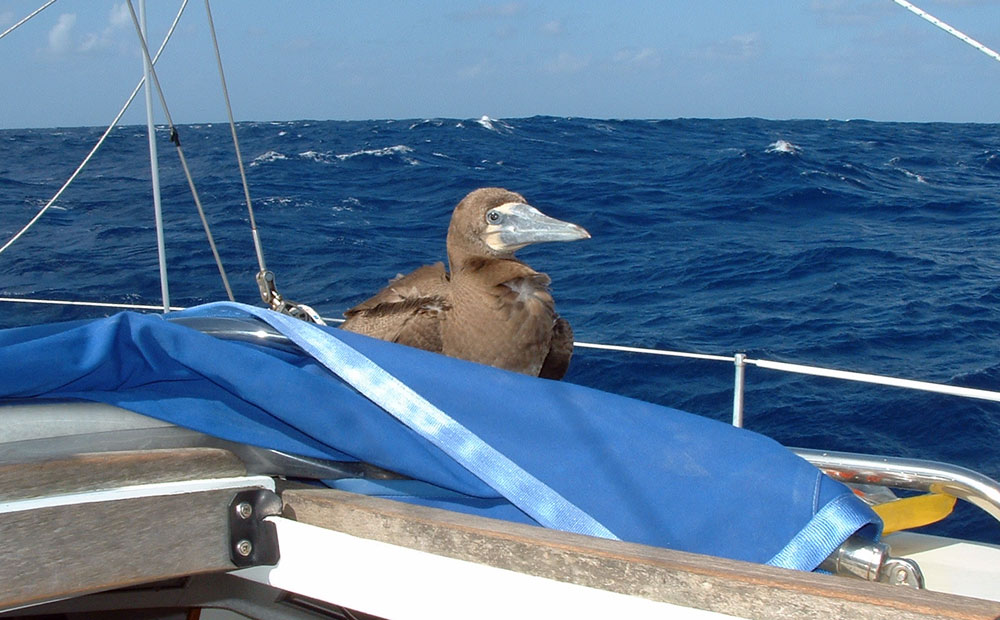 Keeping an eye on things...
Keeping an eye on things...Other examples of the origin of the expression “bird-brain” were demonstrated regularly. Once replete with fish he took to wandering about on the solar panels, the cumulative evidence of his presence there affecting their production of amps in no small way.
Alarmingly, he would edge closer and closer to the adjacent wind generator such that in the end I had to prevent the blades from turning to avoid the inevitable and colourful accident.
Even so he would peck at them if he felt that they got too close. This marked the end of free power generation and daily use of the engine instead.
Our diet suffered too. Trolling for tuna and dorado was definitely out of the question as I was sure that the daft Bird would have had the lure as soon as it hit the water.
The minute the sun went down, he would face into the wind, put his head between his wing feathers like a duck does, and remain so until sunrise the following day.
In an attempt to outsmart him, I took to trolling during my night watches whilst he was asleep. I didn't catch anything though, which is presumably why he didn't bother with it.
Our Bird had been tagged on its starboard foot as follows, which may give a hint as to his home address...
Tag details
AVISE EMAVE
O.P. 34BRASILIA
U35879
In accordance with the advice given in "Seabirds", I sent the tag details to an organisation known as The Seabird Group, together with the following information:
- Date, location and time of sighting;
- Meteorological conditions, including wind direction and strength, cloud cover and precipitation, i.e. mist, fog, rain, hail or snow;
- Sea temperature;
They were kind enough to reply to my letter, informing me that our Brown Booby was ringed at Archipelago de Sao Pedro, Sao Paulo, Brazil (0°55'N, 29°20'W) on the 4th October 2001.
If you are "fortunate" enough to provide a berth for such a passenger, the Seabird Group will always appreciate a record of your observation.
Our Bird stayed with us for 11 days, leaving us some 330 miles east of Guadeloupe.
To our great surprise, we missed him - a lot!
Notes...
- "Seabirds" is published by Christopher Helm (Publishers) Ltd, a subsidiary of A & C Black (Publishers) Ltd.
- The Seabird Group, c/o the Royal Society for the Protection of Birds, The Lodge, Sandy, Bedfordshire, SG19 2DL.
- Many years after writing this article I came across a Facebook Group called Birding Aboard. It's well worth a look...
Recent Articles
-
Albin Ballad Sailboat: Specs, Design, & Sailing Characteristics
Jul 09, 25 05:03 PM
Explore the Albin Ballad 30: detailed specs, design, sailing characteristics, and why this Swedish classic is a popular cruiser-racer. -
The Hinckley 48 Sailboat
Jul 09, 25 02:44 PM
Sailing characteristics & performance predictions, pics, specifications, dimensions and those all-important design ratios for the Hinckley 48 sailboat... -
The Hinckley Souwester 42 Sailboat
Jul 09, 25 02:05 PM
Sailing characteristics and performance predictions, pics, specifications, dimensions and those all-important design ratios for the Hinckley Souwester 42 sailboat...
